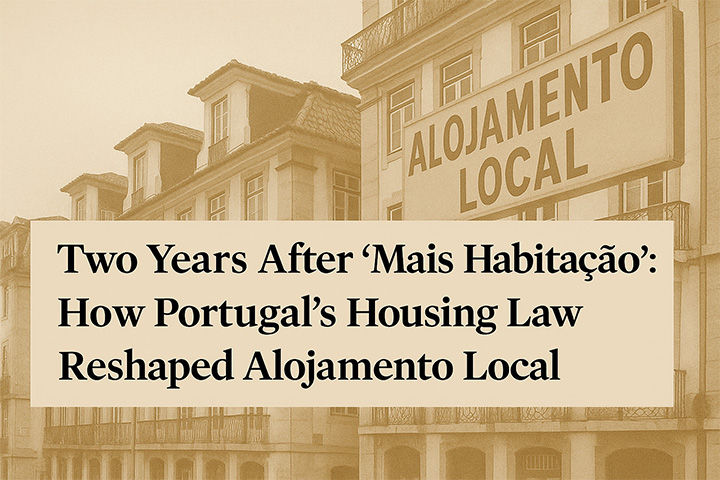
Two Years After “Mais Habitação”: How Portugal’s Housing Law Reshaped Alojamento Local
In 2023, Portugal’s “Mais Habitação” package promised to tackle the housing crisis by cracking down on Alojamento Local (AL), the short-term rental sector that had become one of the pillars of the country’s tourism economy. The measures sparked immediate controversy, uniting thousands of property owners in protest and triggering legal challenges in national and European courts.
Now, in 2025, the dust has settled—at least somewhat. The last two years have shown both the limits of political intervention in the housing market and the resilience of an industry that many predicted would not survive.
The 2023 Turning Point
The original package suspended new AL registrations in high-density municipalities, with limited exceptions for rural areas. Existing licenses were allowed to remain, but operators faced new hurdles: condominium approval requirements, higher taxation, and the prospect of mandatory renewal in 2030.
The government framed the measures as necessary to free up housing for residents, especially in Lisbon and Porto, where rents had risen sharply. But opponents accused the state of scapegoating small business owners while ignoring deeper issues such as underinvestment in public housing, red tape in urban planning, and speculative real estate practices.
Protests outside parliament, billboard campaigns, petitions, and coordinated lobbying followed. Associations representing AL owners warned that the measures would damage Portugal’s global reputation, deter investment, and undermine tourism.
2024: Legal Battles and Market Adjustments
As expected, the fight moved to the courts. Several associations filed challenges with the Constitutional Court and the European Court of Justice, arguing that the restrictions violated property rights and the principle of free enterprise. While some appeals are still ongoing in 2025, Portuguese courts have so far upheld the government’s authority to regulate housing in the “public interest.”
At the same time, the practical effect of the law was uneven:
-
Lisbon and Porto: New AL registrations effectively ground to a halt. Some owners shifted to long-term rentals, but many kept properties vacant or sold them instead, citing bureaucratic barriers and lack of profitability.
-
Interior regions: The exception for low-density municipalities encouraged a small boom in rural AL. However, the demand never matched urban levels, limiting the impact.
-
Detached houses: Loopholes in the law meant some owners continued registering standalone properties in suburban areas, maintaining a trickle of new AL supply.
The condominium unanimity rule also proved disruptive. In many cases, a single neighbor vetoed applications, frustrating would-be hosts. Critics say this fueled resentment among owners and encouraged conflict in buildings that were previously harmonious.
Tourism and Economic Fallout
Portugal’s tourism industry weathered the restrictions better than many expected, but not without consequences.
Hotel chains benefited from reduced competition, especially in Lisbon and Porto, but room prices rose steeply in peak seasons. Tourists who once relied on affordable AL apartments faced higher costs or were pushed toward suburban and rural areas.
Studies published in 2024 confirmed what AL defenders had argued in 2023: the sector was responsible for more than 100,000 jobs and nearly 4% of GDP. By limiting growth, the government inadvertently cut into local economic activity, particularly in small businesses—cafés, restaurants, and shops—that depended on AL guests spending in their neighborhoods.
Where Things Stand in 2025
Two years later, the law remains in force, though cracks are appearing.
-
Housing affordability: Rents have not fallen in Lisbon or Porto. In fact, they have continued to climb, driven by strong demand, slow construction, and foreign buyers. Critics argue that AL restrictions failed to deliver on the government’s core promise.
-
Tourism rebound: Portugal continues to break records for international arrivals, thanks in part to new flight connections. But with fewer short-term rentals available in city centers, tourists often pay more or stay outside historic neighborhoods.
-
AL adaptation: Many operators who feared extinction have survived by shifting strategies—expanding into rural areas, targeting higher-income travelers, or converting to mid-term rentals (30–90 days), which remain legal and attractive to digital nomads.
-
Legal uncertainty: The 2030 license renewal requirement looms large. Unless the government revises the law, tens of thousands of owners face the possibility of losing their AL business in just five years.
Looking Ahead
The “Mais Habitação” debate illustrates a broader European struggle. From Barcelona to Amsterdam, governments are grappling with how to regulate short-term rentals without undermining tourism or alienating voters.
For Portugal, the outcome has been mixed. The AL sector has shrunk, but the promised relief for renters has not materialized. What has emerged instead is a sharper divide between large hotel operators and small independent hosts, as well as a climate of legal uncertainty that continues to discourage new investment.
--
As 2025 unfolds, the question remains: will Portugal adjust its course, acknowledging that restricting AL alone cannot solve its housing crisis? Or will it double down, leaving the courts and the next government to decide the fate of thousands of small operators?


